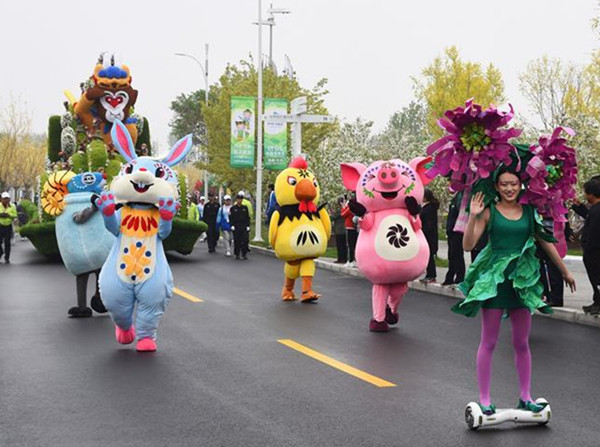China more active in promoting green development globally
 0 Comment(s)
0 Comment(s) Print
Print E-mail Xinhua, May 3, 2019
E-mail Xinhua, May 3, 2019
As China makes headway in pursuing high-quality economic growth, its resolve and plan for green development are reflected in the latest major events hosted by Beijing -- the Second Belt and Road Forum for International Cooperation (BRF) and the international horticultural expo.

Green is a keyword for both the forum themed on "Belt and Road Cooperation: Shaping a Brighter Shared Future" from April 25 to 27 and the International Horticultural Exhibition 2019 Beijing, the largest event of its kind that opened to the public on April 29 under the theme of "Live Green, Live Better."
These two international events highlight that China has been in the vanguard of promoting green growth and ecological sustainability, thanks to its tradition-based wisdom, effective governance and, more importantly, the great vision of building a community with a shared future for humanity.
Participants and media were impressed by the BRF's emphasis on the importance of green development and sustainability. Belt and Road cooperation should be "open, green and clean" and "pursue high standards and people-centered, sustainable development," according to the Joint Communique of the Leaders' Roundtable of the BRF, attended by nearly 40 heads of state and government.
A concrete result on the list of deliverables of this forum is the joint launching of the BRI International Green Development Coalition by China and 25 other countries, as well as international organizations including the United Nations Environment Programme and research institutions. BRI refers to the Belt and Road Initiative proposed by China in 2013, aiming to build a trade and infrastructure network connecting Asia with Europe and Africa along the ancient Silk Road routes to seek common development and prosperity.
During the forum, the BRI Environmental Big Data Platform was officially launched to provide information on environmental policy, law, standards, technology and industry for countries along the Belt and Road. China's Ministry of Ecology and Environment established the Belt and Road Environmental Technology Exchange and Transfer Center.
Rapid economic growth boosted by China's reform and opening-up policy once caused widespread pollution of water, soil and air in many rural and urban areas. The country then began to shift its extensive growth model to an intensive one to curb pollution.
Harmony between man and nature is a key idea in ancient Chinese philosophy. Reiterating that "lucid waters and lush mountains are invaluable assets," Chinese leadership has stressed that the country must embrace eco-friendly models for growth and ways of life.
In particular, the country put more importance on environmental protection in 2012 when the 18th National Congress of the Communist Party of China first raised the vision of building a "Beautiful China," and the country's "five-sphere" integrated plan for development, which included ecological progress.
In recent years, implementing its new concept of innovative, coordinated, green, open and shared development, China has exerted intensive efforts to treat pollution with the enforcement of much stricter environmental laws, problem-oriented environmental supervision, river and lake chief schemes, mechanisms regarding ecological compensation and public interest litigation involving environmental issues, among others.
Take Beijing as an example. Residents in the capital enjoy more blue-sky days than they did several years ago. Compared with 2013, the city's average concentration of fine particulate matter PM2.5 fell from 89.5 to 51 micrograms per cubic meter last year, or 43 percent.
In late 2017, the Saihanba afforestation community in northern China's Hebei Province won the U.N. Champions of the Earth Award for creating a vast man-made forest covering about 93,000 hectares in northern China, making great contributions to the restoration of degraded landscapes.
A study in February using data from NASA satellites showed that China had contributed to at least 25 percent of the increase in the global green leaf area since the early 2000s.
The horticultural expo in Yanqing of Beijing, which lasts until October 7, provides another window into how to realize green living.
Displaying a variety of locally cultivated colorful flowers, the indoor exhibition hall of Shanxi Province inside the China Pavilion in the expo park is themed on "New Shanxi on the Crown of Flowers."
"Shanxi is no longer mainly relying on its coal industry for growth. Instead, we are developing clean energy and other emerging industries," said Qin Zexin, a guide in the provincial hall. "These beautiful flowers represent our yearning for a better and richer life."
"China is living up to the theme of the expo," said Jim Sikin Kakon, a Papua New Guinea exhibitor. "Developed countries must do more in the preservation of the environment. Developing countries should try to promote green living while developing themselves."
Over the past 40 years, China's forest coverage rate has increased nearly 10 percentage points to 21.66 percent. The country is home to the world's largest man-made forest in scale.
China's efforts in pursuing green growth and advancing ecological progress have contributed a lot to the world and provided inspiration to other countries in environmental protection.
"We hope that the Beijing horticultural expo shows the world the momentum of China's green development, ... and that all countries join hands to promote green living," said Hu Jie, who is in charge of the planning of the expo.
In 1999, the International Horticultural Exposition was held in Kunming, capital of southwest China's Yunnan Province.
Over the past 20 years, China's horticultural industry has made huge progress and the country's ecological conservation efforts have also delivered remarkable achievements, Hu said.
"China has led the way in promoting green development," said Bernard Oosterom, president of the International Association of Horticultural Producers, at the opening ceremony of the expo on April 28. "I am confident that the legacy of this expo will be greener lives for generations to come," he said.






Go to Forum >>0 Comment(s)